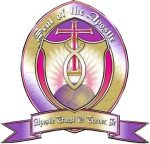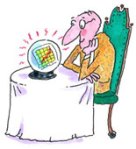True Prophets vs. False Prophets, How Can You Tell Them Apart? 
What is a prophet? A prophet is a person who receives a prophecy, message from God, and then communicates that message to others. A divinely inspired message is always direct, specific, and tells exactly what will happen, to whom, and precisely what people should do. Moreover, a true prophecy from God always comes true in every detail. Predictions that “mostly” come true are not good enough. A true prophet is 100% accurate !
Two opposite forces operate in our world: the good force and the evil force. The good force is lead by the one and only true God Almighty, whose personal name is Jehovah; His Son Jesus Christ, our Messiah; and the Holy Spirit, which is God’s active force that He uses to perform every and any miraculous sign. Angels also belong to this good group, as they do the will of Jehovah both in the heavens and on Earth.
The evil force is run by Satan, the devil, and his demons, which were originally good angels who chose to rebel against God. Many people laugh at the idea of demons, dismissing them merely as part of children’s ghosts stories. But demons are no laughing matter; they’re real, and unless we take them seriously, we will fall victim to their schemes. These evil spirits’ purpose is to go against God in every way, so it is important to know their tactics lest we are deceived. And one of their tactics is imitating God’s prophets and prophecies.
How can you tell a true prophet of God from the false prophet of Satan? The below basic guidelines will assist your discernment:
• True prophets always speak in God’s name with the authority given by God. False prophets speak in a name other than Jehovah’s. This is the first and foremost test whether a prophet is from God or Satan. If someone cannot pass this test, there’s no other reason to go on to the other tests.
• True prophecies, as mentioned, always come true exactly as  they are told. False prophecies, on the other hand, do not come true, even if they are spoken in God’s name.
they are told. False prophecies, on the other hand, do not come true, even if they are spoken in God’s name.
Some prophecies may appear to be fulfilled when they are told in an ambiguous way. For instance, if I say, “A dog will bark in two hours,” and a dog does bark two hours later, does that make me a true prophet? No, because I did not indicate a specific dog. What I predicted could have spoken by anyone. A true message from God would have named a specific dog, giving no doubt to whether the prophecy had come true when it did indeed come true.
• True prophets exhibit godly qualities: true love, peace, joy, longsuffering, faith, goodness, gentleness, meekness, and temperance, which are the fruit of the Holy Spirit working in believers. (Read Galatians 5:22-23 in your Bible.) True prophets do good works and speak good words. False prophets do not possess this good nature. Even though Satan and the demons can perform miracles, they do not imitate God’s good qualities, so this is one of the best ways to differentiate the true from the false prophets.
• True prophets glorify God through their words, action, and any supernatural signs they perform. They credit Jehovah for the power they receive. False prophets glorify spirits other than God.
• True prophets lead people to God and His teachings. False prophets do not.
Since false prophets (also known as fortune-tellers, mediums, and psychics) have powers from Satan, Jehovah God strictly forbids people to be psychics and mediums:
and mediums:
“There shall not be found among you anyone who makes his son or daughter pass through the fire, or who uses divination, or is a soothsayer, or an augur, or a sorcerer, Or a charmer, or a medium, or a wizard, or a necromancer. For all who do these things are an abomination to the Lord, and it is because of these abominable practices that the Lord your God is driving them out before you. You shall be blameless [and absolutely true] to the Lord your God. For these nations whom you shall dispossess listen to soothsayers and diviners. But as for you, the Lord your God has not allowed you to do so.” (Deuteronomy 18.10-14, Amplified Bible)
“You shall not eat anything with the blood; neither shall you use magic, omens, or witchcraft [or predict events by horoscope or signs and lucky days].” (Leviticus 19.26)
“Turn not to those [mediums] who have familiar spirits or to wizards; do not seek them out to be defiled by them. I am the Lord your God.” (Leviticus 19.31)
“A man or woman who is a medium and has a familiar spirit or is a wizard shall surely be put to death, be stoned with stones; their blood shall be upon them.” (Leviticus 20.27)
False prophets will not be a part of God’s Kingdom after resurrection: “But as for the cowards and the ignoble and the contemptible and the cravenly lacking in courage and the cowardly submissive, and as for the unbelieving and faithless, and as for the depraved and defiled with abominations, and as for murderers and the lewd and adulterous and the practicers of magic arts and the idolaters (those who give supreme devotion to anyone or anything other than God) and all liars (those who knowingly convey untruth by word or deed)–[all of these shall have] their part in the lake that blazes with fire and brimstone. This is the second death.” (Revelation 21.8)
 We have no need for Satanic powers and fortunetelling abilities, for every person who puts trust in Jesus will be able to personally connect with God, without needing a middleman, besides Jesus, God’s Son; Jesus is the only mediator we need.
We have no need for Satanic powers and fortunetelling abilities, for every person who puts trust in Jesus will be able to personally connect with God, without needing a middleman, besides Jesus, God’s Son; Jesus is the only mediator we need.
Jesus specifically said, “Not everyone who says to Me, Lord, Lord, will enter the kingdom of heaven, but he who does the will of My Father Who is in heaven.” (Matthew 7.21) Thus, if we want to reflect the goodness of God, we must do God’s will to the best of our ability. Jehovah said, “Ye shall be holy; for I Jehovah your God am holy.” (Leviticus 19.2, ASV) So if we desire to serve Him and reflect His goodness, we must be holy, and the way to be holy is do what He says and conform to His standards, not our own standards.
